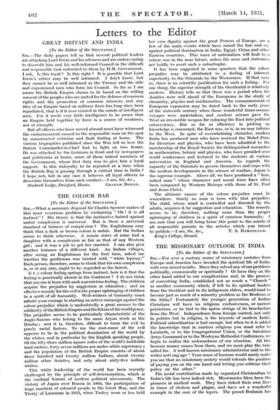THE COLOUR BAR
[To the Editor of the SPECTATOR.]
SIR,—What a summary disposal Sir Charles Spencer makes of this most vexatious problem by exclaiming " Oh ! it is all instinct" 1 His theory is that the instinctive hatred against unfair complexion is universal. But is there a universal standard of fairness of complexion ? The Englishman may think that a dark or brown colour is unfair. But the Indian seems to think otherwise. A cousin sister of mine had a daughter with a complexion as fair as that of any Western girl ; and it was a job to get her married. I can also give another instance of a different kind. An Indian villager, after seeing an Englishman for the first time, asked me whether the gentleman was tainted with " white leprosy." Each person, therefore, seems to think that his own complexion is, or at any rate, ought to be, regarded as the fairest.
If t ,e colour feeling springs from instinct, how is it that the feeling is practically absent in the Continent ? I do not think that anyone is born with such a pernicious feeling. The children acquire the prejudice by suggestion or education ; and an effective remedy for the evil is the proper upbringing of children in a spirit of all humanity. Well-wishers of humanity must admire your courage in starting an active campaign against the colour prejudice which is undoubtedly a great menace to the solidarity of the British Empire and the future of the world peace. The prejudice seems to be particularly characteristic of the Anglo-Saxons who belong to the same Aryan stock as the Hindus ; and it is, therefore, difficult to trace the evil to purely racial factors. To me the root-cause of the evil appears to lie in the political domination of the world by the whites, and in particular by the English speaking people. Of the fifty-three million square miles of the world's habitable land surface, forty-seven millions are under white supremacy ; and the population of the British Empire consists of about three hundred and twenty million Indians, about twenty million other Asiatics, and only about sixty-five million whites.
This white leadership of the world has been recently challenged by the principle of self-determination, which is the cardinal feature of modern political niovements. The victory of Japan over Russia in 1904, the participation of huge numbers of coloured people in the Great War, and the Treaty of Lausanne in. 1923, when Turkey more or less held her own dignity against the great Powers of Europe, are a few of the main events which have raised the hue and cry against political domination in India, Egypt, China and other Eastern countries. This wave of nationalim will lead to a colour war in the near future, unless the seers and statesmen act boldly to avert such a catastrophe.
It has been suggested in some quarters that the colour prejudice may be attributed to a feeling of inherent superiority to the Orientals by the Westerners. If that were so, there is no scientific justification for such a feeling. For one thing, the superior strength of the Occidental is relatively modern. History tells us that there was a period when the Asiatics were well ahead of the Europeans in the study of chemistry, physics and mathematics. The commencement of European expansion may be dated back" to the early years of the sixteenth century when those wonderful trans-oceanic voyages were undertaken, and modern science gave the West an irresistible weapon for reducing the East into political subserviency. But so far as efficiency in picking up knowledge is concerned, the East was, or is, in no way inferior to the West. In spite of overwhelming obstacles, modern India has produced men who have received the Nobel Prize for literature and physics, who have been admitted to the membership of the Royal Society for distinguished researches in mathematics, botany and physics, who have presided over world conferences and lectured to the students at various Universities in England and America. As regards the capacity of the Orientals to govern themselves and cope with the modern developments in the science of warfare, Japan is the supreme example. Above all, we have produced a " lean, naked man " whose character and moral force have often been compared by Western Bishops with those of St. Paul and Jesus Christ.
The ultimate causes of the colour prejudice must lie somewhere. Surely no man is born with that prejudice. The child, whose mind is controlled and directed by the adults, acquires it by suggestion and education. The remedy seems to be, therefore, nothing more than the proper upbringing of children in a spirit of common humanity I am sure that you will bring home this point to the minds of all responsible parents in the articles which you intend























































 Previous page
Previous page